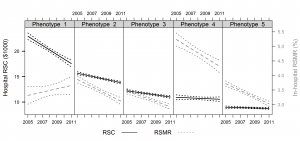August 7th, 2014
How Should We Evaluate Hospital Care?
Xiao Xu, PhD
CardioExchange’s Harlan Krumholz asked Dr. Xiao Xu to discuss recent findings from her study of hospital differences in cost and clinical outcomes for heart failure treatment in a broad sample of hospitals. The study, “Phenotyping” Hospital Value of Care for Patients with Heart Failure, is published in Health Services Research, and the figure depicting the 5 distinct phenotypes is reprinted below. Each panel in the figure reflects one hospital phenotype—that is, a distinct group of hospitals that experience a unique pattern of risk-standardized cost (RSC) and risk-standardized mortality rate (RSMR) over time.

Reprinted from Xu X et al. “Phenotyping” Hospital Value of Care for Patients with Heart Failure. Health Services Research. doi: 10.1111/1475-6773.12197 © 2014 The Health Research and Educational Trust
As a health economist, I am certainly interested in ways to reduce health care costs, but I am more concerned about how we can slow the rising costs without adverse consequences to patients. This requires us to think about value—i.e., cost in the context of outcomes. Can we lower costs while improving—or at least maintaining—patient outcomes?
One approach is to look at our current system and try to understand who is achieving the best value and investigate how they are doing it. In our paper, we phenotype hospitals by the value of their care for patients with heart failure. In addition to cost, we look at mortality to see which hospitals achieve low mortality at low cost.
In this process, we notice some very interesting patterns. Some hospitals have similar mortality rates but very different costs, while others have similar costs but quite distinct mortality rates—and this is after accounting for how sick their patients are. What does this tell us? Hospitals vary considerably in how they turn inputs into outputs.
This provides a superb opportunity for hospitals to learn from each other. If all hospitals can emulate high-value hospitals—those with low mortality and low cost—we will save tremendous health care dollars as well as patients’ lives. A dual focus on both cost and patient health outcomes should be the new lens through which we see health care now.
